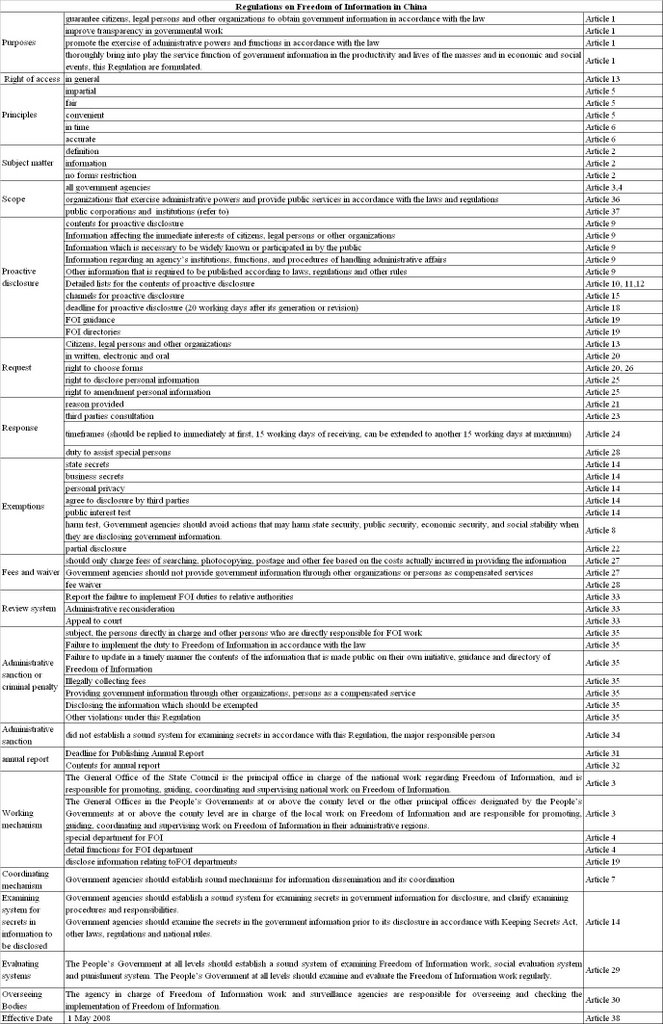Three Levels of Information Asymmetry for FOI
FOI is one of important mechanism to offset information asymmetry between the government and citizens[1] and thereby the adoption and implementation of FOI legislation will have a strong effect on the degree of information asymmetry between them. In my view, FOI normally can be classified into three levels, including the high, middle and low levels, according to the various degrees of information asymmetry.
The degree of information asymmetry in the high level is higher than the second and third levels. This level just recognizes the relationship between the government and citizens and try to depend on FOI to diminish the influences of the agency shirk. The adoption of FOI legislation is stand-alone and static without considering the impacts of records management and information technology. This level notices the conflicts between FOI and privacy protection, but with little attention. This level normally expects that FOI law can be worked automatically and ignores the importance of its implementation. FOI Statistics is not important and independent oversight authority cannot be found in the legislation. Because of the lack of experiences, the legislation is generally conservative compared with the other levels as the exemptions are broad and no public interest override applied and the coverage is limited. This level of FOI further neglects its use by citizens and thereby citizens bear high cost for information which is not only limited to their money, but also their time and capability as the legislation normally assumes that citizens know where is the information stored and what kind of information they want to request. Information provided is government-centred. On the contrary, the cost for governments is low as they have enough room to pursue their own interests.
The middle level evidences less information asymmetry between the government and citizens than the high level. This level not only recognizes the relationship between the government and citizens, but also citizens’ use. The agency shirk cannot only depend on FOI legislation. The focus on the implementation by the government is also on the agenda. The adoption of FOI legislation is pressured by other factors and linked with other mechanisms, such as records management and information technology. FOI legislation in this level appears to be stronger than the first one as the exemptions are clearly defined and public interest override is applied in the limited circumstances. They notice the problem of implementation and depend on the traditional system to oversight the implementation, rather than a new independent authority. However, citizens still bear high cost for obtaining information as information is provided by governments separately and information provided is citizens-centred. Meanwhile, governments still have room to deviate from the public interest.
The low level is expected to the lowest degree of information asymmetry. This level considers the relationship between the government and citizens, citizens’ use, and the influences among government agencies. FOI legislation is innovative and progressive. Not only the exemptions should be strongly limited and scientifically defined, but also the coverage should be the broadest and defined flexibly. There is an independent oversight authority, for example, information commissioner, to ensure the implementation of FOI legislation by government agencies. Records management and information technology should be maintained and applied to fit for the goal of information available. Citizens’ cost for information should be dramatically decreased based on the application of information technology. There is a strongly requirement for privacy protection as information can be easily sorted by technology. Citizens are not only viewed as citizens with a right to know, but also as customers. Information provided is users-centred. However, the cost for governments increased as their pursuing for private interests can be observed easier than other two levels.
[1] Joseph Stiglitz, “Transparency in Government” in the World Bank, ed., The Right to Tell: The Role of Mass Media in Economic Development (Washington D.C: The World Bank, 2002) 28. "> " title="permanent link">#
[1] Joseph Stiglitz, “Transparency in Government” in the World Bank, ed., The Right to Tell: The Role of Mass Media in Economic Development (Washington D.C: The World Bank, 2002) 28. "> " title="permanent link">#


No comments:
Post a Comment